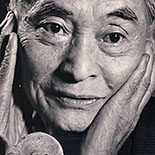 Yasunari Kawabata (June 11, 1899 – April 16, 1972) was a Japanese novelist and short story writer whose spare, lyrical, subtly-shaded prose works won him the Nobel Prize for Literature in 1968, the first Japanese author to receive the award. His works have enjoyed broad international appeal and are still widely read.
Yasunari Kawabata (June 11, 1899 – April 16, 1972) was a Japanese novelist and short story writer whose spare, lyrical, subtly-shaded prose works won him the Nobel Prize for Literature in 1968, the first Japanese author to receive the award. His works have enjoyed broad international appeal and are still widely read.
The book that he himself considered his finest work, The Master of Go (1951), is in severe contrast to his other works. It is a semi-fictional recounting of a major Go match in 1938, on which Kawabata had actually reported for the Mainichi newspaper chain. It was the last game of the master Shūsai’s career and he lost to his younger challenger, only to die a little over a year later. Although the novel is moving on the surface as a retelling of a climactic struggle, some readers consider it a symbolic parallel to the defeat of Japan in World War II.
Kawabata left many of his stories apparently unfinished, sometimes to the annoyance of readers and reviewers, but this goes hand to hand with his aesthetics of art for art’s sake, leaving outside any sentimentalism, or morality, that an ending would give to any book. This was done intentionally, as Kawabata felt that vignettes of incidents along the way were far more important than conclusions. He equated his form of writing with the traditional poetry of Japan, the haiku.
As the president of Japanese P.E.N. for many years after the war (1948–1965), Kawabata was a driving force behind the translation of Japanese literature into English and other Western languages. He was appointed an Officer of the Order of Arts and Letters of France in 1960, and awarded Japan’s Order of Culture the following year.
https://www.youtube.com/watch?v=vAdcdZXZ8vY